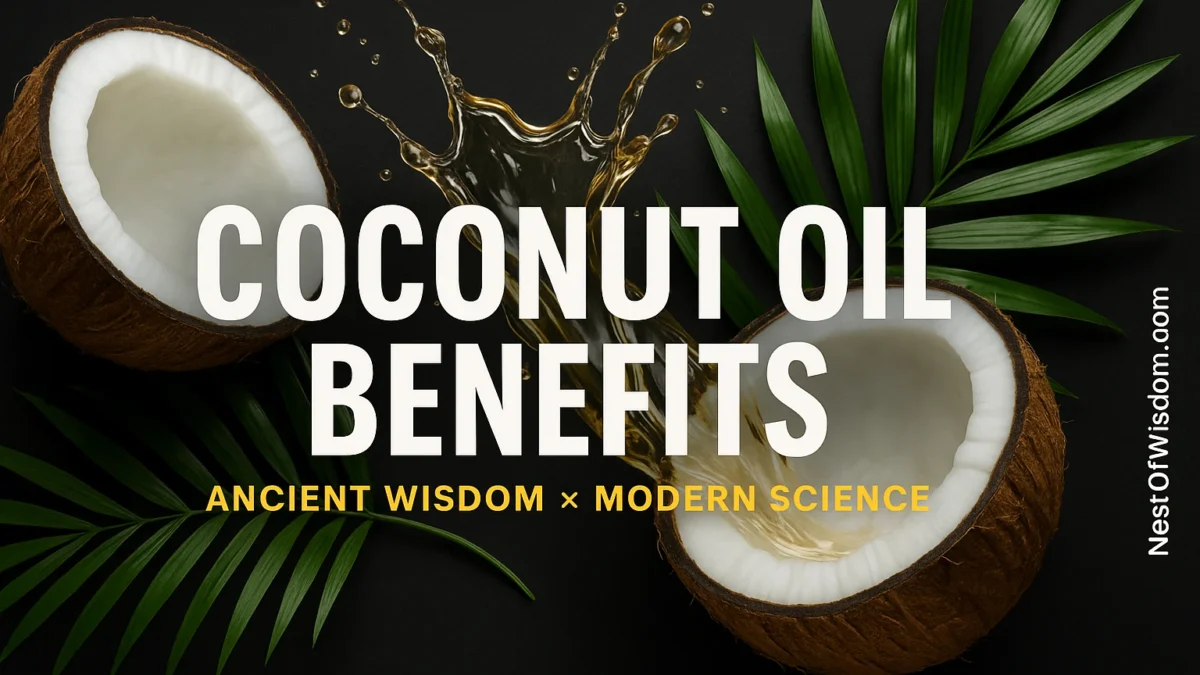Table of Contents
- Introduction
- What Is Coconut Oil?
- Ancient Tamil & Ayurvedic Uses
- 1) Coconut Oil & Brain Health (Context & Caution)
- 2) Coconut Oil & Heart Health (Balanced View)
- 3) Coconut Oil for Skin & Hair
- 4) Coconut Oil & Weight Management (MCTs vs. Coconut Oil)
- 5) Oral Health (Oil Pulling)
- 6) Wounds & Minor Skin Irritation
- How to Choose Quality Coconut Oil
- 25+ Ways to Use Coconut Oil (Culinary & Topical)
- Storage, Shelf Life & Safety
- Sourcing & Sustainability
- Myths vs Facts
- Common Mistakes to Avoid
- Conclusion
- See Also on Nest of Wisdom
- Useful Sources & Further Reading
- Medical Disclaimer
Introduction: The Hidden Power of Coconut Oil
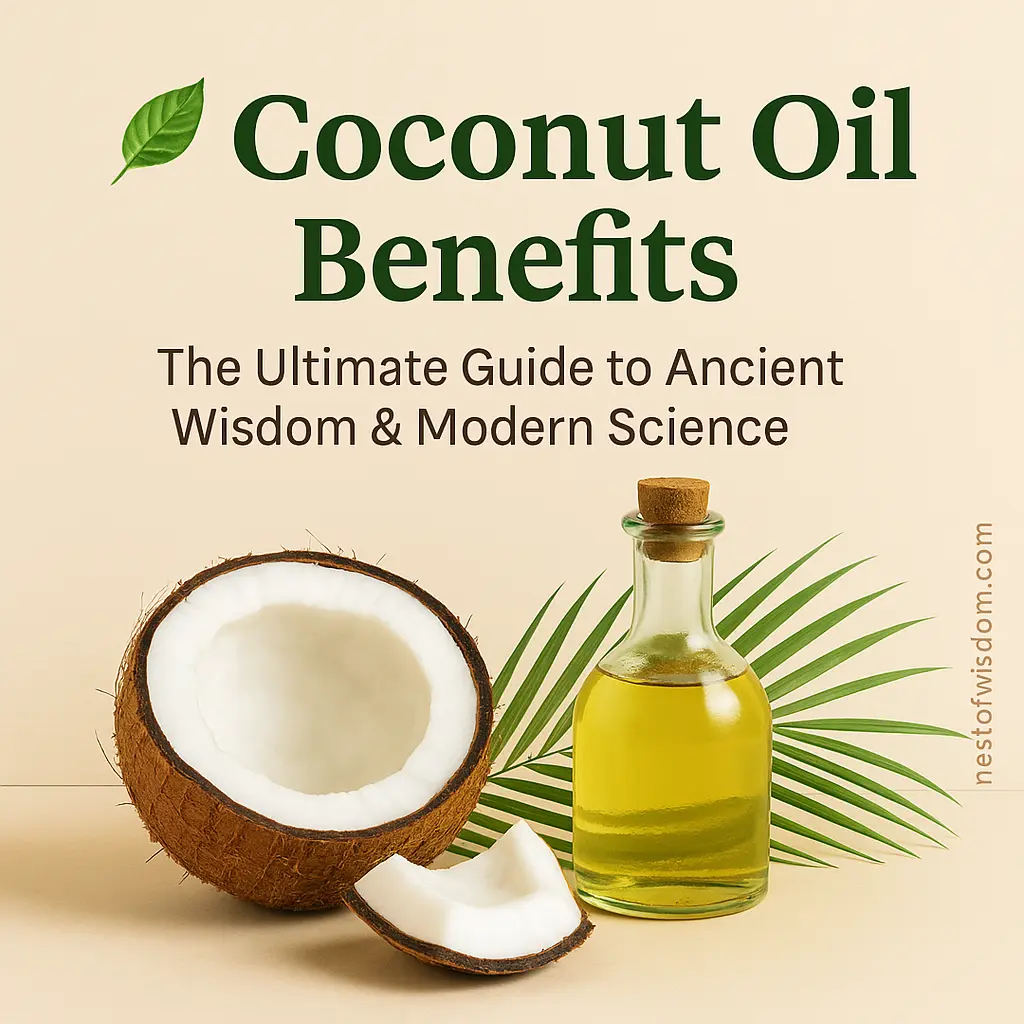

Coconut Oil Benefits have shaped wellness traditions in Tamil Nadu and across the tropics for centuries. From baby massage and postpartum care to coastal cooking, coconut oil is more than an ingredient—it’s culture. Today, modern nutrition looks at how its medium-chain triglycerides (MCTs), lauric-acid–derived lipids, and antioxidant compounds might fit into healthy routines.
This guide offers a balanced, AdSense-safe view of Coconut Oil Benefits: where evidence looks promising or limited, how to use coconut oil responsibly, and how to blend tradition with practical modern habits.
Related Guides
- Ghee Benefits: The Ultimate Guide
- 5 Sesame Oil Benefits: The Ultimate Guide
- 5 Powerful Herbal Drinks to Lower Blood Sugar
- Top 10 Low Glycemic Index Foods for Diabetics
- Brain-Boosting MIND Diet: 7 Proven Foods
- 11 High-Fiber Foods for Constipation Relief
- 7 Ayurvedic Remedies to Manage Diabetes
What Is Coconut Oil?
Coconut oil is pressed from mature coconuts and is naturally high in saturated fat. A notable portion is in the form of MCTs, which are absorbed and metabolized differently from longer-chain fats—often used quickly for energy and, in some contexts, converted into ketone bodies. This unique metabolism explains why discussions about Coconut Oil Benefits can be nuanced.
- Virgin Coconut Oil (VCO): minimally processed; retains aroma and some antioxidants.
- Refined Coconut Oil: neutral flavor; more processed; suitable when you don’t want coconut taste.
- Fractionated/MCT Oil: mostly caprylic/capric acids; liquid; used in specific culinary or supplemental contexts (note: not the same as coconut oil).
Quick kitchen facts: moderate smoke point, stable for sauté/temper; still avoid charring. Pair with vegetables, pulses, and spices to keep Coconut Oil Benefits in balance with overall diet quality.
Ancient Tamil & Ayurvedic Uses
Long-standing practices celebrate Coconut Oil Benefits as cooling and soothing. Tamil households traditionally use coconut oil for baby massage, postpartum care, scalp oiling to reduce dryness, seasonal cooking, and ritual lamps. Tradition offers a helpful lens—modern readers can pair it with today’s evidence and clinician guidance for a grounded approach.
தமிழ் கருத்து: தேங்காய் எண்ணெய்—உடலும் மரபும் இணைக்கும் ஒரு நாள் தோழன்.
1) Coconut Oil & Brain Health (Context & Caution)


MCTs in coconut oil can be converted into ketone bodies, an alternative brain fuel when glucose use is impaired. Reviews discuss ketone availability and brain energy metabolism; this supports a cautious, context-driven take on Coconut Oil Benefits rather than therapeutic claims. If you have neurological conditions, consult your clinician before experimenting with MCTs or changing your diet substantially.
Everyday tip: if you enjoy the flavor, include small amounts of virgin coconut oil within a varied plate—prioritize vegetables, pulses, whole grains, and regular movement for overall brain and metabolic health.
For long-term cognitive nutrition, pair healthy fats with a Brain-Boosting MIND Diet pattern rich in greens, berries, and whole grains.
2) Coconut Oil & Heart Health (Balanced View)
Compared with unsaturated oils (olive, safflower, mustard/groundnut), coconut oil may raise LDL cholesterol, even though it can raise HDL. Guidelines commonly advise making unsaturated fats your default for heart health and using coconut oil in modest amounts for flavor or cultural dishes. This approach respects heritage while keeping Coconut Oil Benefits aligned with modern evidence.
Practical pattern: rotate oils through the week—use olive/mustard/groundnut oil for daily cooking, and coconut oil when the recipe calls for its taste (e.g., coastal curries, tempering). Combine with fiber-rich foods to support a heart-smart pattern.
Round this out with a low-GI plate and consider herbal drinks that steady glucose if you’re managing sugars.
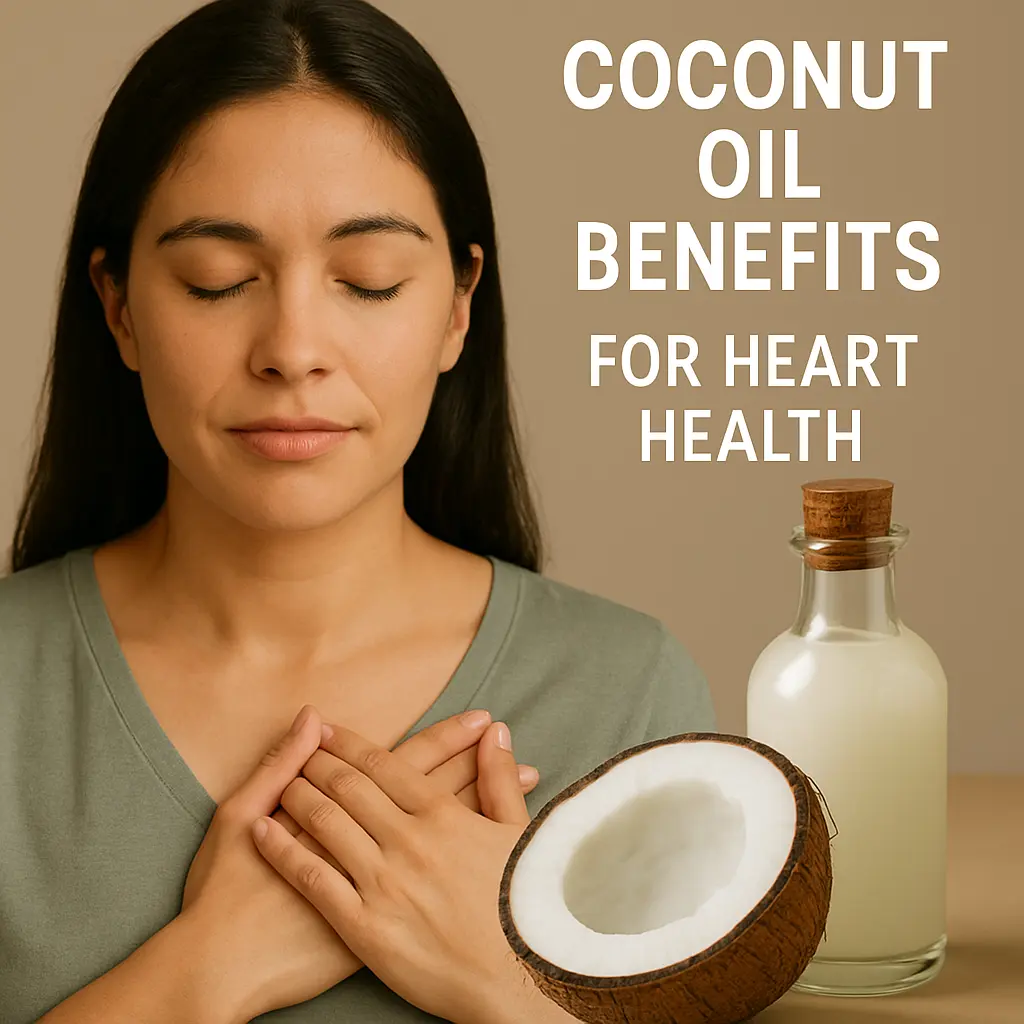

3) Coconut Oil for Skin & Hair
Many readers notice Coconut Oil Benefits most directly on skin and hair. Virgin coconut oil helps seal moisture, and lauric-acid–derived lipids show antimicrobial activity in lab settings. Small clinical trials note improvements for dry skin and some dermatitis when applied correctly.
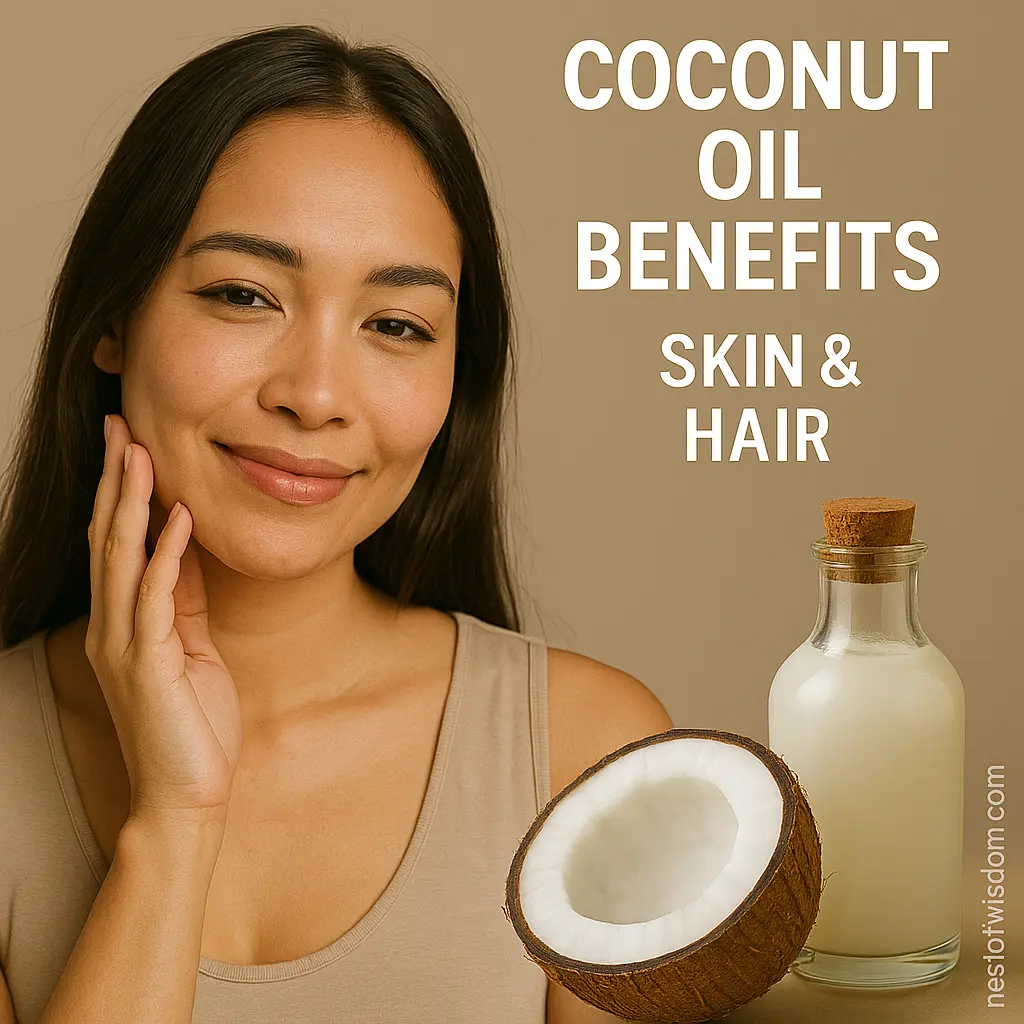

Skin tips
- Apply a thin layer on damp skin to lock in moisture.
- Patch-test for acne-prone skin; some complexions prefer lighter oils or non-comedogenic creams.
- For mild irritation, cleanse first, then use a pea-sized amount as a barrier.
Hair tips
- Warm a teaspoon in your palms; apply mid-length to ends before shampooing.
- Helps reduce protein loss and frizz; avoid heavy scalp build-up.
- Comb through gently and rinse thoroughly.
For targeted care, see Castor Oil Benefits (scalp & lashes) and Sesame Oil Benefits (abhyanga, skin barrier).
4) Coconut Oil & Weight Management (MCTs vs. Coconut Oil)
Research on MCT oil suggests modest effects on satiety and energy expenditure in some contexts. But coconut oil is not the same as MCT oil; it contains a broader mix of fatty acids and behaves differently in studies. For sustainable results, prioritize overall diet quality, protein adequacy, fiber, sleep, and daily movement—then place Coconut Oil Benefits as a flavor enhancer within your calorie budget.
Portion cue: think teaspoons to a tablespoon depending on your daily fat allotment. Use it where the flavor truly shines, and keep the rest of your fats mostly unsaturated.
Combine MCT-conscious cooking with high-fiber foods and organic superfoods to boost satiety without spikes.
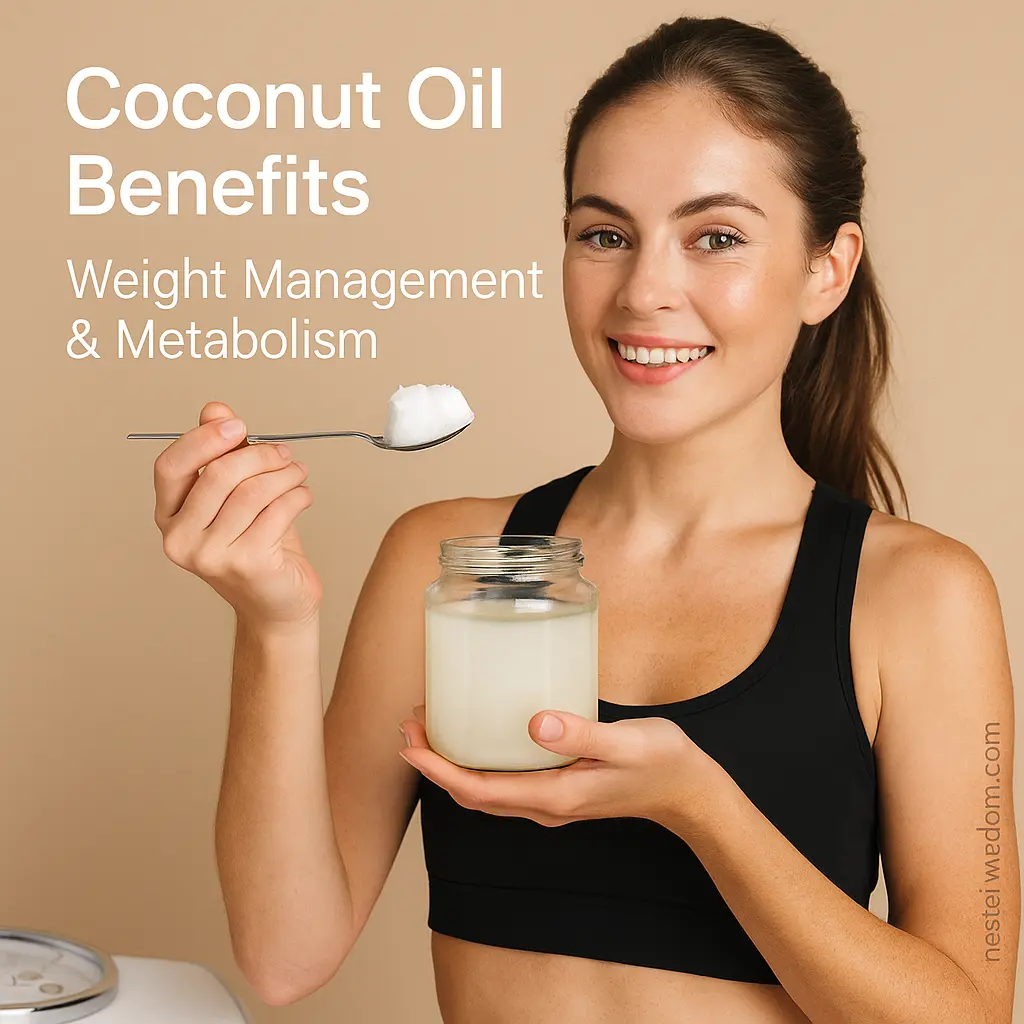

5) Oral Health (Oil Pulling)
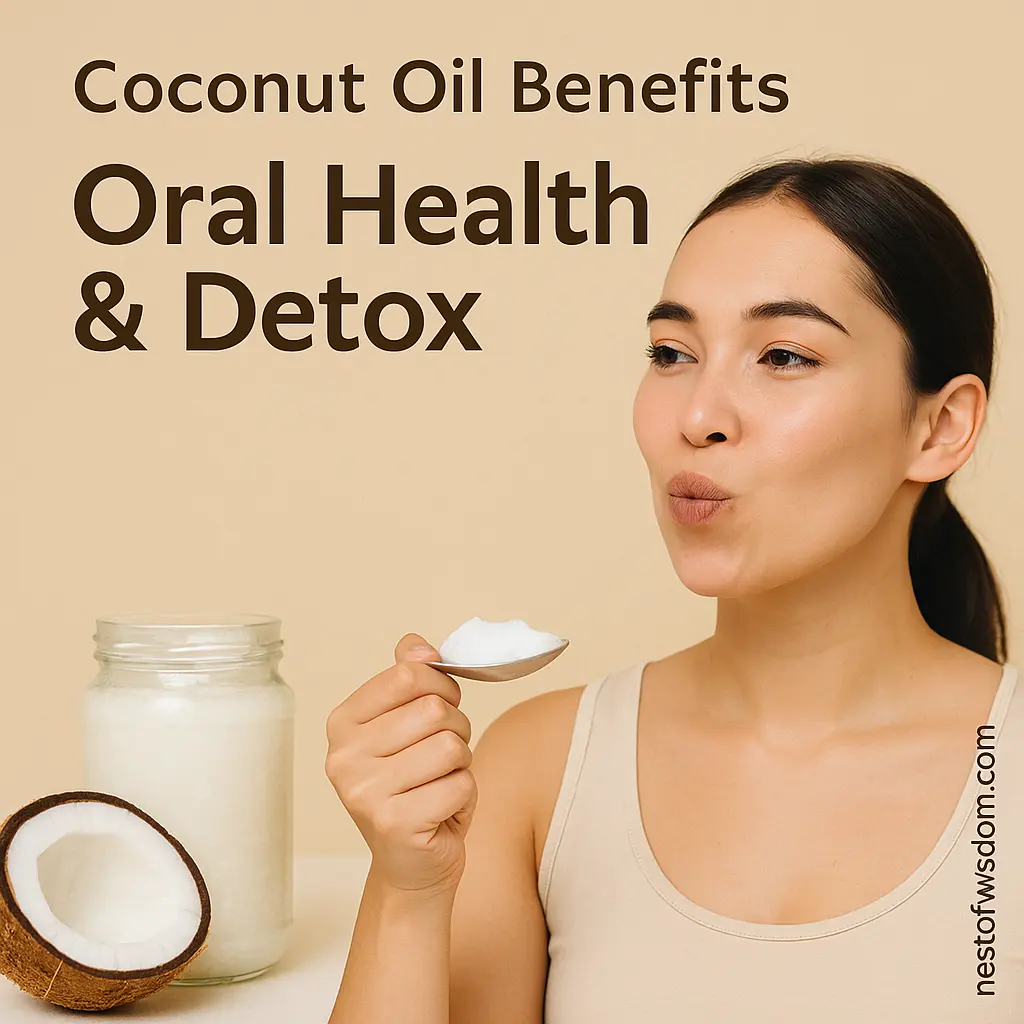

Small clinical studies indicate coconut oil pulling may help reduce plaque and gingival scores. Evidence remains limited, and dental organizations emphasize that oil pulling is not a substitute for brushing with fluoride toothpaste and flossing. If you enjoy the practice, continue standard oral hygiene and consider oil pulling as an optional add-on to your Coconut Oil Benefits routine.
6) Wounds & Minor Skin Irritation
Lauric acid and related lipids can disrupt certain microbes in lab settings. For minor, clean abrasions or dry, irritated patches, a very light layer may ease dryness. Seek medical care for deeper wounds, burns, persistent rashes, or suspected infection. Keep Coconut Oil Benefits in perspective: nourishing, but not a replacement for medical care.
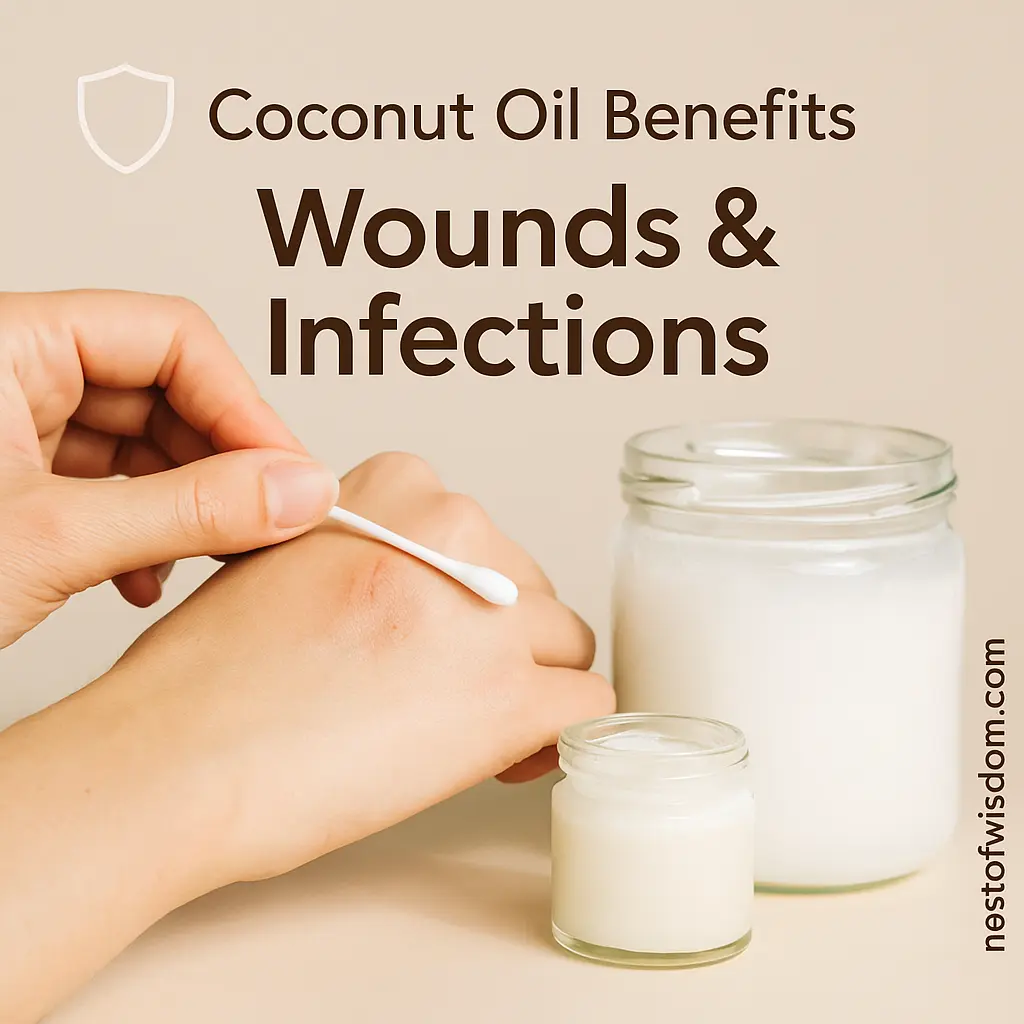

How to Choose Quality Coconut Oil
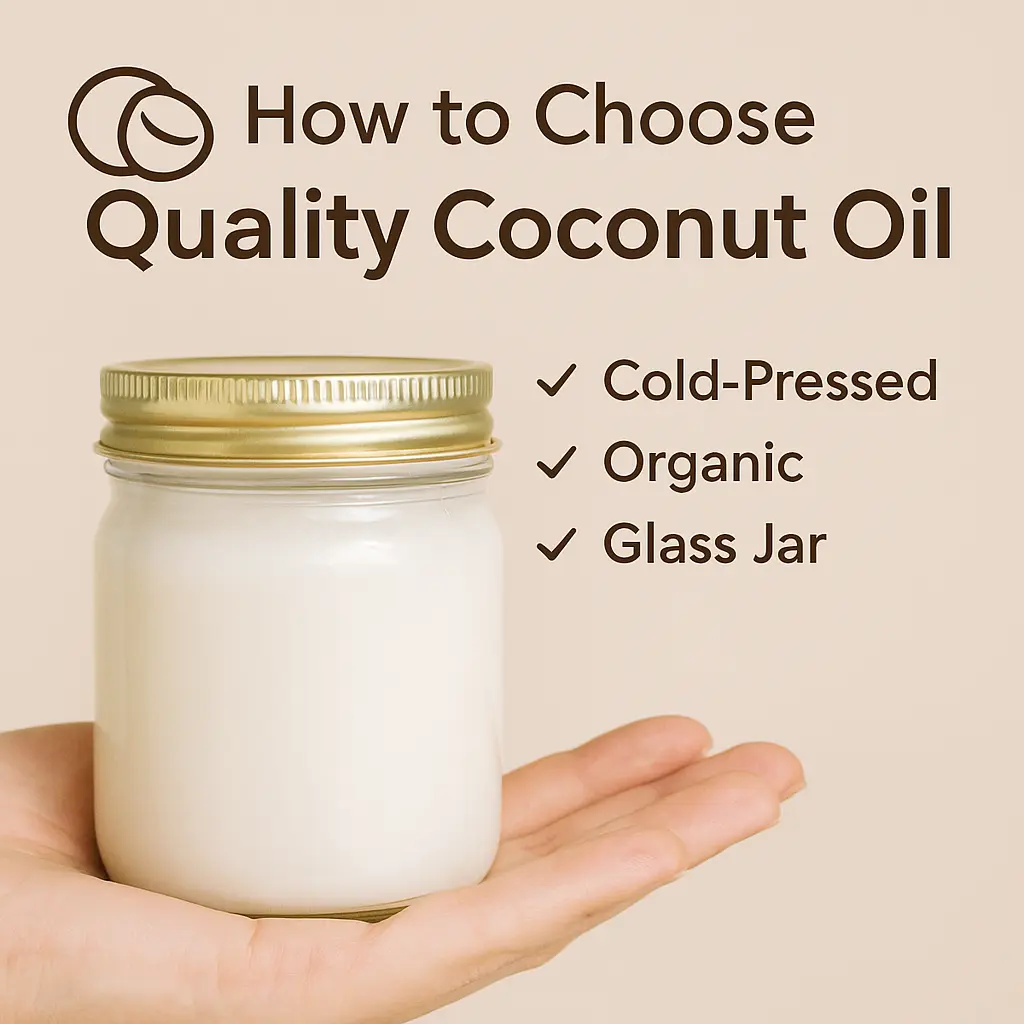

- Virgin/cold-pressed: for aroma and minimal processing.
- Transparent sourcing: reputable brands with testing.
- Glass jar: if possible; store cool and dark.
- Batch freshness: check manufacture date; prefer recent lots.
- Flavor check: pleasant coconut aroma; discard if rancid or soapy.
Quality amplifies Coconut Oil Benefits—choose well, and use in amounts that fit your health goals.
Curious about other traditional fats? Compare with Ghee Benefits and Groundnut Oil Benefits for everyday cooking.
25+ Ways to Use Coconut Oil (Culinary & Topical)
Here are practical, evidence-informed ways to enjoy Coconut Oil Benefits without overdoing it:
- Temper curries & dals (small spoon) for authentic coastal flavor.
- Roast vegetables gently—pair with turmeric/pepper for a fragrant sheet pan.
- Stir-fry greens with mustard seeds and curry leaves.
- Toast spices at low-medium heat for sambal or thogayal.
- Millet/cauli rice finish—½ tsp for aroma.
- Idiyappam/keto-ish bowls—light drizzle.
- Chutneys—tempering with coconut oil for depth.
- Energy bites—bind with nut/seed flours (portion control!).
- Popcorn—tiny tsp + salt for a tropical twist.
- Cast-iron care—thin coat after cleaning.
- Dry elbows/heels—dab a pea-sized amount.
- Pre-shampoo hair oil—ends only, thin layer.
- Lip balm—pin-head amount for shine.
- Make-up remove—gentle wipe, then cleanse.
- Cuticle care—massage a dot at night.
- After-sun comfort—light layer on intact skin.
- Seasonal dry patches—thin barrier on damp skin.
- Masala omelette/paneer—½ tsp for coastal note.
- Thoran/poriyal—classic taste with moderation.
- Breakfast porridge—¼ tsp swirl + cardamom.
- Grill glaze—mix with lime, ginger, chilli.
- Peanut chutney temper—tiny sizzle of spices.
- Pre-bath baby massage (traditional; follow pediatric guidance).
- Postpartum care—cultural practice; personalize with clinician advice.
- Festival sweets—replace part of ghee/oil (flavor first, portion mindful).
Storage, Shelf Life & Safety
- Store: cool, dark place; lid closed; avoid moisture.
- Shelf life: typically 12–24 months unopened; shorter once opened—use sensory checks.
- Allergies/sensitivity: rare; patch-test on skin; stop if irritation occurs.
- Medicines/conditions: if you have heart, liver, kidney, skin, dental, or neurological conditions, personalize use with a clinician.
- Kids: follow pediatric guidance; keep amounts tiny and avoid choking hazards.
Smart storage protects flavor and helps you experience Coconut Oil Benefits at their best.
Sourcing & Sustainability
Choose brands that support fair pay and safe working conditions for smallholder farmers. Look for transparent sourcing, third-party audits, and minimal-plastic packaging where possible. Sustainable choices complement Coconut Oil Benefits with community benefits too.
Myths vs Facts
- Myth: Coconut oil is a cure-all.
Fact: It’s a food fat with specific culinary and topical uses—helpful in context, not a medicine. - Myth: MCT oil and coconut oil are identical.
Fact: They differ in fatty-acid profile and study outcomes. - Myth: More is always better.
Fact: Mind portions; calories count. Place Coconut Oil Benefits within an overall healthy pattern.
Common Mistakes to Avoid
- Using coconut oil for all cooking—rotate oils and favor unsaturated fats most days.
- Heavy topical layers leading to clogged pores—use very thin amounts.
- Assuming oil pulling replaces brushing/flossing—keep standard dental care.
- Skipping storage basics—heat and moisture speed rancidity.
Avoiding these errors keeps Coconut Oil Benefits pleasant, practical, and safe.
Conclusion
Coconut Oil Benefits are real in everyday life when used thoughtfully: terrific flavor for traditional dishes, practical topical care for dry skin and hair, and a meaningful cultural connection. Keep portions modest, rotate with unsaturated oils, and pair with vegetables, pulses, whole grains, good sleep, and regular movement. With that balance, coconut oil fits comfortably into a modern, healthful routine.
See Also on Nest of Wisdom
- Plant-Based Protein Sources: 15 Best Picks
- 7 Daily Habits for Better Sleep
- Diabetic-Friendly Indian Breakfasts
Useful Sources & Further Reading
- American Heart Association — Dietary Fats & Cardiovascular Disease
- Harvard T.H. Chan — Coconut Oil Overview
- BMJ Open — Coconut Oil vs Olive Oil vs Butter (RCT)
- American Dental Association — Oil Pulling: Caution
- NIH/PMC — Research Library (search “ketone bodies brain”)
Medical Disclaimer
Education only: The information on this page does not replace professional medical advice, diagnosis, or treatment. Do not start, stop, or change any medication or therapeutic plan without your clinician’s guidance. Coconut oil can be part of some diets in small amounts; people with heart, liver, kidney, skin, dental, or neurological conditions should seek personalized advice. If you feel unwell, stop and consult a qualified healthcare professional.
Nest of Wisdom Insights is a dedicated editorial team focused on sharing timeless wisdom, natural healing remedies, spiritual practices, and practical life strategies. Our mission is to empower readers with trustworthy, well-researched guidance rooted in both Tamil culture and modern science.
இயற்கை வாழ்வு மற்றும் ஆன்மிகம் சார்ந்த அறிவு அனைவருக்கும் பயனளிக்க வேண்டும் என்பதே எங்கள் நோக்கம்.
- Nest of Wisdom Authorhttps://nestofwisdom.com/author/varakulangmail-com/
- Nest of Wisdom Authorhttps://nestofwisdom.com/author/varakulangmail-com/
- Nest of Wisdom Authorhttps://nestofwisdom.com/author/varakulangmail-com/
- Nest of Wisdom Authorhttps://nestofwisdom.com/author/varakulangmail-com/
Related posts
Today's pick
Recent Posts
- Internal Linking Strategy for Blogs: A Practical, Human-Centered Playbook
- AI in the Automotive Industry: A Practical, Human-Centered Guide
- Cloud Tools for Small Businesses and Freelancers: The Complete Guide
- Generative AI in Business: Real-World Use Cases, Benefits & Risks
- 7 Life-Changing Daily Habits for Weight Loss Without Dieting

